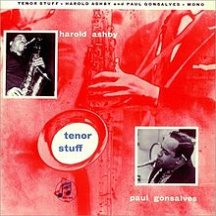 Tenor Stuff Landsdown Jazz Series 33XS 1379 Recorded January 1961, NYC, USA |
Personnel
Paul Gonsalves - Tenor saxophone / Guitar Harold Ashby - Tenor Saxophone Ray Nance- Trumpet Sir Charles Thompson- Piano Aaron Bell - Bass Jo Jones- Drums |
Track Listing
1. You Came Along From Out of Nowhere (Green) 2. Swallowing the Blues (Graham) 3. London Broil (Gonsalves) 4. Midnight Sun (Jones) 5. Squeeze Me (Williams) 6. Blue Skies (Berlin) 7. Jeeps Blues (Ellington & Hodges) 8. You Can Depend on Me (Carpenter, Dunlap & Hines) |
The pairing of these men inevitably reminds us of an earlier meeting of the tenors— when Coleman Hawkins and Ben Webster were teamed on BLUE SAXOPHONES. And this, in a sense, is a descendant of that union, for Gonsalves admits: "Coleman Hawkins was my main influence ... I admired Lester Young, but Coleman Hawkins was it for me", while Harold Ashby says that Ben Webster was his first and most important musical influence.
Since Webster was himself indebted to Hawkins, stylistically speaking, it can reasonably be said that Ashby and Gonsalves belong to the same tenor tradition; the more so as Gonsalves was also directly influenced by Webster's later playing. But all these men have developed in their own ways, so that each possesses a total sound which can be positively identified by anyone familiar with his work.
Listeners should not have too much difficulty in separating Ashby from Gonsalves here. Ashby has the higher and lighter sound, a tone rather like an alto sax at times, a tone which tends to "crumble at the edges." He likes to contrast lengthy phrases with short flurries of notes, so that his manner sometimes seems abrupt and breathless, and to employ tonal shadings which, at one extreme, thin his sound into wispiness.
Gonsalves favours a broader, firmer, more sinewy and masculine tone, with a "dirtier" expression, and a more flowing, balanced phraseology. He has a highly distinctive harmonic approach which makes him immediately recognisable when once the hearer has become acquainted with his manner of "running the changes". Both men employ a soft, breathy tone for ballad interpretation, and it is in this department—where their allegiance to Ben Webster is most evident—that their styles come closest together.
The first title presents the tenors with rhythm section. After the opening duet, Ashby takes off on his own, high and fluttery; then comes Sir Charles on piano, followed by Gonsalves in forceful, driving form. The arrangement here is by Britain's Kenny Graham, composer of the next title, Swallowing The Blues. Gonsalves takes the first tenor solo on the blues, Ashby the second; then Paul solos on guitar, an instrument, he learned to play in his youth. This is his debut on records as a guitarist, but his stark, strangely effective blues choruses make it certain that he will be heard as a guitarist again. On London Broil (American for a mixed grill), Gonsalves is again the first soloist on tenor. After Ashby's contribution, Paul returns on guitar to play several chase choruses with Ashby's tenor. For Quincey Jones' Midnight Sun ballad, the order of soloists is Gonsalves, Ashby, Gonsalves, Sir Charles Thompson.
Trumpeter Ray Nance—like Gonsalves, an Ellington sideman—is added to the group for Side Two. This allows for a fuller ensemble sound and an extended range of solo "voices", Nance playing trumpet—also fiddle on Squeeze Me and You Can Depend On Me—and providing the vocal on the last-named title. His relaxed but heated trumpet is an attractive feature of these four tracks.
The music heard on this record is a fine example of the unpretentious kind of jazz these musicians like to play when they are "stretching out": adventurous but not avant garde, traditional but not old-fashioned, free-ranging in its moods and full of that improvisational spirit which is the lifeblood of jazz.